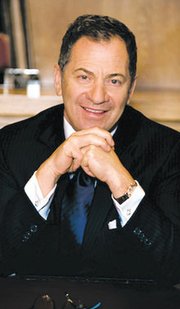L.A. Investor Alec Gores Sees Future in Apparel and Retail
For 25 years, Los Angeles billionaire Alec Gores has made his fortune by turning around underperforming technology and industrial companies and selling them for a nifty profit.
Last year, the head of The Gores Group discovered the apparel world and has been snapping up companies in a wide variety of ventures that span from luxury dresses to metallic fasteners.
Since August 2010, The Gores Group has bought or acquired controlling interests in J. Mendel, maker of fur coats and high-end dresses; Big Strike Inc., a Los Angeles #8232;juniorswear company; Mexx, a European and Canadian retailer once owned by Liz Claiborne Inc.; and Scovill Fasteners, a trim company that was bought in bankruptcy court.
For Gores, this is only the beginning. The company is hunting to acquire more apparel companies that could be operated together and perhaps even rolled into one publicly traded company.
Think Kellwood Co. and the various labels, such as Vince and Rebecca Taylor, it has gobbled up in recent years. Kellwood is owned by Sun Capital Partners Inc., a private-investment firm.
“This is an area that is underinvested in. And there are not many private-equity firms or operations-oriented firms in this area. So there is less competition,” said Lee Bird, who was hired in March by The Gores Group to oversee operations of the company’s apparel and retail acquisitions. “We are going to be an active buyer in juniors, contemporary and misses.”
Bird was sitting inside the company’s 18th-floor office in Los Angeles’ Westwood neighborhood, where a large conference room, replete with bowls of Lindt truffles and bottles of Fiji water, looks out toward the University of California, Los Angeles campus.
Bird brings years of apparel experience to his new position. Most recently he was with Nike Inc., where he was a group president in charge of brands such as Cole Haan, Converse, Hurley and Umbro. Before that, he had various high-level executive positions at Gap Inc.
The Gores Group’s foray into the apparel industry started after the venture raised $2 billion in its third fund, Gores Capital Partners III L.P., which closed this year. It is dedicated to investments in telecommunications, business services, industrial, healthcare and consumer entities.
Alec Gores’ awareness of the apparel industry came in part from his daughter, Rochelle Gores Fredston, who owns the high-end Arcade Boutique on Melrose Avenue in West Hollywood, Calif. “I think there is no question she [Rochelle] has had a positive impact with our investments in the apparel industry,” Gores wrote in an email. “She has a keen eye for fashion, and we are fortunate to have her insights as we continue our expansion in the apparel sector.”
Gores noted he was attracted to the apparel industry because he determined it has significant upside potential and room for growth using the company’s strategic and operational capabilities.
Surprise move
The Gores Group is not the only private-equity firm to recently dabble in the apparel industry. This year, Relativity Capital in Arlington, Va., made a significant investment in Jessica’s, a Los Angeles off-price apparel distributor owned by Richard Koral. And Monitor Clipper Partners in Cambridge, Mass., made an equity investment this year in Roger Garments, a Montebello, Calif., company founded in 2003 by Yoni Kassar and Lori Price. The company designs, sources and sells women’s private-label and branded apparel.
The Gores Group’s interest in apparel left some stunned. “We were somewhat surprised. I didn’t think that was something they had an interest in,” said Gilbert Harrison, chairman and founder of Financo Inc., a longtime New York investment banking firm that has put together various deals in the apparel industry. Harrison said he has worked with Liz Claiborne, but The Gores Group never showed up on his radar when it came time to sell Mexx.
Some are wondering if The Gores Group is acquiring the right mix of companies. Andreas Kurz, former chief executive of 7 For All Mankind and now owner of consulting firm Akari Enterprises Inc., thinks the company is spreading its interests too wide. “If you are new to the sector, the secret to success would be to focus on the mass market or contemporary or high-end and stay there,” he observed.
But Rob Greenspan, chief executive and president of apparel-orientedGreenspan Consult in Los Angeles, thinks perhaps the company has taken a wide position to spread its risks. “Some people have made fortunes doing this,” he said. Fortune forward
The Gores Group usually doesn’t stumble, and apparel should be no different.
Eight months after purchasing J. Mendel, the company is turning a profit, Lee Bird said. “It was a good brand, but the brand was underperforming,” Bird said, noting that Gilles Mendel, heir apparent and designer for the fur and ready-to-wear label, was trying to create too many looks, was spread too thin and had difficulty obtaining financing.
The Gores Group got the company to concentrate on dresses and lower the price points from the $5,000 to $7,000 range to $2,000 to $4,000. An aggressive marketing and public-relations campaign is putting more stars on the red carpet in J. Mendel frocks. Even the Olsen twins, the pint-sized actresses who have a number of their own labels, were seen sitting in the front row with Alec Gores to view J. Mendel’s Spring 2012 collection at Mercedes-Benz Fashion Week in New York in September.
The Gores Group has big plans for Big Strike, whose owners—Lars Viklund, Kevin Talbot and Jodi Sundberg—retain a one-third interest.
“We liked it because it was in a great sector, fast fashion; they had a great partnership with their stores [JCPenney, Sears and Kohl’s]; and they had a really good management team,” Bird said.
But the $100 million company needed more money and expertise to make it to the next level. The Gores Group hopes to pump up revenues to $200 million to $400 million and then maybe sell it or turn it into a publicly traded company.
Already, the juniors top maker is expanding the company’s HeartSoul label from juniors to include misses for Spring 2012 delivery. “We liked the company as a platform for other acquisitions,” Bird said. “We can buy other businesses and combine them with Big Strike and have some good synergy. They could be misses, contemporary or bottoms businesses.”
That way, Big Strike could have several offerings for retail stores instead of just juniors tops.
For its Mexx acquisition, The Gores Group is planning by the end of 2012 to close 110 underperforming stores of the 167 company-owned stores in Europe. It will open outposts in more-lucrative locations with the goal of establishing 10 new stores a year starting in 2013. Already, a new sleek metropolitan-style store design is being rolled out in Antwerp and Brussels, Belgium; Stockholm; and Krefeld, Germany. In Europe, there are still 377 franchised stores and 31 concession stores.
The chain’s merchandise, which also is sold to stores outside of the Mexx network, has been revamped and is selling well, Bird said.
Last year, according to documents filed with the Securities and Exchange Commission, Mexx had an operating loss of $100 million on $732 million in revenues. Average sales per square foot were $265. The Gores Group would like to see that sales number pushed up to at least $400 per square foot.

























